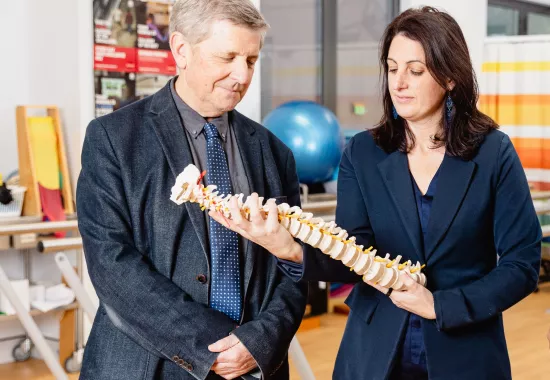A team of researchers from the Kolling Institute’s John Walsh Centre for Rehabilitation Research has launched a study to develop the first internationally accepted guidelines for assessing cognitive function after a spinal cord injury.
The latest data indicates that over 15 million people globally live with a spinal cord injury, and in Australia, there are over 20,000 people living with the injury.
There are around 300-400 new cases of this injury every year in Australia.
The devastating physical impact of these injuries has been extensively studied from the loss of motor control (such as paralysis) to the pain and sensory issues, and the significant problems with cardiovascular and respiratory function.
However, the psychological and cognitive impacts of this severe neurological injury have not been as well understood, such as the extent of cognitive impairment and mental health disorders over time.
There is now a growing body of evidence around the psychosocial consequences of a spinal cord injury, with new studies by the John Walsh Centre for Rehabilitation Research highlighting a concerning trend.
Professor of Rehabilitation Ashley Craig said we are just completing the first ever study conducted anywhere internationally that has assessed cognitive function and potential cognitive impairment in adults with a spinal cord injury from soon after their injury in the acute stage, until their discharge from rehabilitation up to 12 months post injury.
“Our research found that at least 30 per cent of adults with a spinal cord injury were assessed as having at least mild cognitive impairment, and that this impairment was identified as a major risk factor for the development of mental health disorders like depressive mood and anxiety after the person is discharged from hospital,” he said.
“This is very concerning given that this may result, not only in a higher risk of a mental health disorder in those with cognitive impairment, but also an increased risk of secondary health conditions like chronic pain, skin problems like pressure ulcers, and respiratory infections. The person with cognitive impairment may become confused and overwhelmed about how best to self-manage these conditions.
“Despite the high number of people experiencing these challenges, our research has identified there are currently no internationally-recognised cognitive assessment tests suitable for measuring cognitive function after a spinal cord injury.”
Our team has now begun research to develop a new framework for cognitive screening, which will involve sensitive and valid cognitive assessment tools.
“This is an important body of work which will build on our prior research to validate the cognitive domain areas we have previously identified that affect most adults with spinal cord injury. We will then develop alternative ways of assessing day to day cognitive function in conjunction with established neurocognitive tests we currently use that are limited.”
“We know that there are multiple possible causes of cognitive impairment after spinal cord injury, such as age, polypharmacy, level of lesion, mental health, fatigue, and autonomic function. Our framework must attempt to account for these possible affects”, Professor Craig said.
The John Walsh team will work with international partners in the UK, Europe and the USA, who are keen to collaborate in the development of a new cognitive assessment framework.
This research will be informed by another current study that is investigating how best to integrate guidelines for psychosocial health and cognitive care with the multidisciplinary health teams managing spinal cord patients in the units at Royal North Shore Hospital, Prince of Wales Hospital and Royal Rehab.
The John Walsh team developed these guidelines which are available on the Agency for Clinical Innovation website:
The team involved is Prof Ashley Craig and Prof James Middleton, Dr Mohit Arora, Dr Ilaria Pozzato, Dr Candice McBain, Dr Danielle Sandalic, Daniel Myles, Anne Marie Sarandrea, Dr Jazbeer Kaur and Dr Yvonne Tran.
